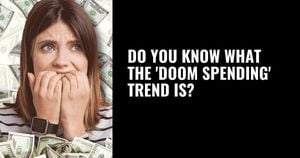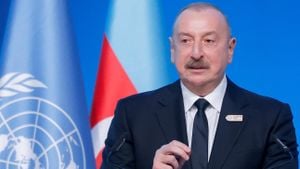Robert F. Kennedy Jr. has stepped forward as President-elect Donald Trump’s choice for Secretary of the Department of Health and Human Services, and his nomination is already stirring controversy. Known for his public opposition to vaccines and alternative health theories, Kennedy's appointment could pose significant risks to established public health protocols across the United States.
Upon his nomination, Kennedy quickly articulated his ambitions for the role, asserting during interviews the need for transparency and evidence-based practices within health agencies. He emphasized his desire to eliminate alleged corruption, and stated his goal to reverse what he perceives as the "chronic disease epidemic" plaguing the nation. Despite these claims, many experts worry Kennedy’s perspectives are rooted more deeply in misinformation than grounded science.
One of the most pressing concerns among health professionals is his stance on vaccination. Kennedy has repeatedly claimed, often without credible evidence, links between vaccines and conditions such as autism—claims which have been thoroughly debunked by numerous studies. The medical community has largely condemned these assertions. Dr. David Elliman, a pediatric consultant at Great Ormond Street Hospital, expressed alarm over Kennedy's influence, cautioning, “If he continues to perpetuate these myths, I fear not just for vaccination programs in the US but globally.”
Kennedy insists he does not seek to restrict vaccine access; rather, he aims to push for reforms he believes would improve vaccine safety. Yet this assertion rings alarm bells for many, as any major shift in his policy could jeopardize public trust, which is already tenuous. “Any rhetoric from such a prominent figure could push more families to hesitate on vaccinating their children,” cautioned Professor Sir Andrew Pollard from the University of Oxford, adding dire warnings about the potential rise of vaccine-preventable diseases.
Aside from vaccine controversies, Kennedy has delved deeply, yet controversially, about the influence of ultra-processed foods on American health. He launched his initiative to "Make America Healthy Again," putting the spotlight on fast food and ultra-processed options which he blames for rising obesity and chronic diseases. His ideas include banning certain processed foods from schools and using food stamps to purchase unhealthy options. Critics are skeptical, questioning whether simply labeling foods as harmful without considering broader dietary habits will effectively alter public health outcomes.
Kennedy's stances on food additives have also raised eyebrows. He has campaigned against colorings and preservatives, citing unsubstantiated claims of potential harm. But, as food safety regulations tighten and science advances, experts largely believe the existing body of evidence doesn't support Kennedy’s views. Dr. David Elliman remarked, “While Kennedy highlights important public health concerns, his claims often lack solid grounding.”
Further complicate the narrative surrounding his nomination are Kennedy’s positions on genetically modified organisms (GMOs) and pesticides. He contends these elements contribute significantly to chronic health issues. While he raises valid discussions, many argue his propositions about banning GMOs and pesticides may overlook increasing agricultural science advancements and the resulting benefits.
Another telling aspect of Kennedy's health policy perspective involves his views on fluoride, commonly added to drinking water to prevent tooth decay. Kennedy opposes fluoridated water, perpetuating the notion of its association with various health risks, claims not substantiated by substantial research. A vocal segment of the medical community staunchly defends fluoridation as beneficial public health practice.
Kennedy has also historically expressed controversial claims related to health issues as they intersect with race. His statements surrounding COVID-19—suggesting the virus was engineered to affect certain ethnicities—have been criticized as unfounded and misleading by many public health experts. These confusing assertions are thought to sow distrust, complicate public responses to health crises, and undermine efforts to convey factual information.
The potential impact of Kennedy's appointment could stretch beyond individual areas of health policy. Given the wide-ranging authority of the Secretary of Health and Human Services over significant national health resources, his influence could fundamentally reshape public health norms as we know them. This concerns many organizations such as the American Public Health Association (APHA), whose executive director has openly voiced opposition to Kennedy's confirmation, labeling him as unfit due to his history of damaging rhetoric surrounding vaccines and public health.
After Kennedy's nomination, shares of vaccine producers like Pfizer and Moderna experienced erratic shifts, reflecting the immediate impact of the political environment on the Pharmaceutical Industry. This market reaction is paving the way for discussions around the economic consequences linked to Kennedy's public health policies.
Looking forward, health experts remain cautious, hoping to contain any ripple effects his policies may incite both domestically and internationally. Given the interconnected nature of health, policy, and public trust, Kennedy’s confirmation carries significant risks, not just for healthcare institutions, but also for the lifelong benefits of established health practices. Public health advocates across the board are rallying, striving to educate the public, debunk misinformation, and uphold scientific integrity as we approach this pivotal change.
Whether Kennedy’s controversial views will shape future health policy remains uncertain, yet the stakes are undeniably high. The outcome of these discussions may influence how future generations perceive vaccines, nutrition, and overall public health as we navigate the challenges of health misinformation and societal trust.



